Session Organizer: Erik Scott, Medtronic
Devices of the future will to do more than deliver therapy or collect biomarkers: to an ever greater degree we expect them to think, to receive remote instructions, and to stream data, ideally in a continuous way, and we expect longer and longer service device service life. When this trend pairs with the drive for miniaturized devices that have improved anatomical fit and streamlined procedures, there is a loud call for innovation in portable power sources that they depend upon for functionality. This session addresses challenges and approaches for improving battery energy and power density while improving the way they are integrated into successful products.
Transforming Hearing Aids into Multifunctional Hearing, Health, and Communication Devices: Conquering the Power-Performance Challenges
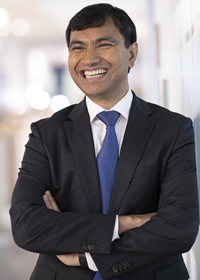
Achin Bhowmik
Chief Technology Officer, Starkey
Abstract: With half a billion people suffering from disabling hearing loss globally according to the World Health Organization, hearing aids are crucially important medical wearable devices. Untreated hearing loss has been linked to increased risks of social isolation, depression, dementia, fall injuries, and other health issues. However, partly due to historical stigma associated with assistive devices and their limited functionalities, only a small fraction of people who need help with hearing have adopted the devices.
In this talk, we will present the transformation of hearing aids into a new class of multifunctional in-ear devices with embedded sensors and artificial intelligence. In addition to providing frequency-dependent amplification of sound to compensate for audibility deficiencies, these devices continuously classify sound with advanced machine learning algorithms and enhance speech understanding, serve as a continuous monitor for physical and cognitive activities, an automatic fall detection and alert system, as well as a personal assistant with connectivity from the edge to the cloud. Furthermore, these devices stream phone calls and music with all-day battery life, translate languages, transcribe speech, and remind the wearer of medication and other tasks.
We will also review the power-performance challenges with these always-on and always-working wearable devices, and how we conquer the perennial tug-of-war between artificial intelligence and battery life.
Bio: Achin Bhowmik, Ph.D., is the Chief Technology Officer and Executive Vice President of Engineering at Starkey, a privately-held medical devices company with over 5,000 employees and operations in over 100 countries. Responsible for the company’s technology strategy, global research, product development, engineering, and program management organizations, he is leading the drive to transform hearing aids into multifunctional health and communication devices with advanced sensors and artificial intelligence technologies.
Prior to joining Starkey, Dr. Bhowmik served as Vice President and General Manager of Perceptual Computing at Intel. There, he was responsible for R&D, engineering, operations, and businesses in the areas of 3D sensing and interactive computing, computer vision and artificial intelligence, autonomous robots and drones, and immersive virtual and merged reality devices.
Dr. Bhowmik is an adjunct professor at Stanford University School of Medicine and Wu Tsai Neurosciences Institute. He is a fellow of the Institute of Electrical and Electronics Engineers (IEEE), fellow of the Asia-Pacific Artificial Intelligence Association (AAIA), fellow and president of the Society for Information Display (SID), and a member of the Forbes Technology Council. His other honors include Top 25 Healthcare Technology CTOs by the Healthcare Technology Report, Notable Leaders in Healthcare by Twin Cities Business, and Healthcare Heroes award from the Business Journals.
He serves on the industry advisory board for the Institute for Engineering in Medicine and Biomedical Engineering at the University of Minnesota, board of advisors for the Fung Institute for Engineering Leadership at the University of California, Berkeley, board of trustees for the National Captioning Institute, and board of directors for OpenCV. He has authored over 200 publications, including two books and 80 patents.
Application Needs and Battery Technology Drivers
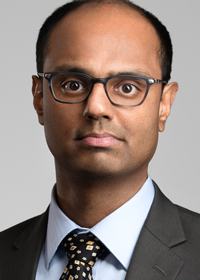
Prabhakar Tamirisa
Senior Manager and Technical Fellow, Medtronic
Abstract: Medical devices including implantable, wearable, surgical tools and hospital equipment are increasingly being powered by battery cells and packs. Innovations in primary and secondary battery technology have enabled advances in medical device technology. This presentation will describe current applications of batteries in medical devices and examine drivers for battery technology in future medical devices.
Bio: Prabhakar Tamirisa leads the Battery & Electrochemical Systems Technology group at Medtronic, which is focused on identifying and developing new battery and capacitor technologies for medical devices, and providing critical technical expertise to the company on development, manufacturing, supply chain and system integration topics. Prabhakar has a Ph.D. in Chemical Engineering from The Georgia Institute of Technology, is a Medtronic certified DFSS/DRM Black Belt and Technical Fellow. He has authored peer reviewed publications, invited book chapters, has multiple patents and given invited presentations at industry conferences and Medtronic’s internal conferences. He has served as President and Secretary of the Twin Cities section of The Electrochemical Society.
Model-Assisted Implantable Battery Development and Manufacturing
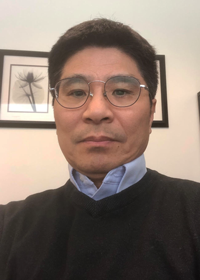
Yuemin Zhang
R&D Director, CRM&N, Integer Holdings
Abstract: Implantable medical batteries usually have a long development cycle from design to manufacturing since the safety, reliability and predictability of the batteries are always the top priority. Most of the time, the form factor of a battery must be customized for a specific device that may result in new process development, adding additional cost and development time. Typically, a device customer relies on the battery manufacturer to predict that a battery will meet the required performance specifications like longevity (e.g., > 10 years) and minimum operating voltage before the battery has been built. While there are many challenges in implantable battery development and manufacturing, model-assisted battery development and manufacturing provides assistance in answering some of those challenges effectively and efficiently, enabling cost savings and acceleration of the development. Since the manufacturing processes will determine if a battery, as an end-product, is reliable over time, it is crucial that we are also able to model the process variation based on manufacturing history of different batteries. In this presentation, the methodology of model-assisted battery development and manufacturing will be discussed.
Bio: Yuemin Zhang is Director of Modeling and Analysis at Research, Development and Engineering of CRM&N in Integer Holdings. He has a Ph.D. in Chemical Engineering and Applied Chemistry from Columbia University.
Thermal Modeling of Medical Batteries
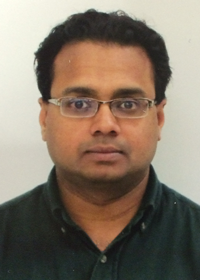
Partha Gomadam
Principal Scientist, Medtronic
Abstract: The high energy and power of the lithium-based batteries make them one of the most successful power source options today. The medical world is no exception with bigger, energy-packed batteries being considered for implanted devices as well as for external medical equipment. The superior electrical performance of these batteries comes with an attendant disadvantage of their relatively high self-heating. Temperatures must be kept under acceptable limits to ensure usability and safety, and for increased longevity. Thus, thermal considerations become an essential part of battery and pack design. Batteries are, therefore, being tested, characterized, and modeled for electrical and thermal performance together. The interaction between the two physics (electrical and thermal) presents interesting modeling challenges in terms of how the model is structured and solved, the parameters involved and how they are obtained, and how the model is validated.
In this presentation, we briefly outline the theory and the key features of the modeling work, and discuss the innovative experiments designed and conducted both at Medtronic and through external labs. The rich learnings from the modeling and testing are presented through case studies highlighting how increasingly energy-power-capable batteries and packs are designed, while ensuring safe performance.
Bio: Over 15 years in the Battery Technology group at MECC (Medtronic Energy and Component Center).
Physics-based modeling of electrochemical and thermal performance of Medtronic batteries.
Ph.D. from Univ of South Carolina on Electrochemical Thermal Modeling of Lithium Ion Batteries.
Session Organizer Bio
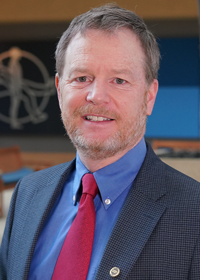
Erik Scott
Senior Distinguished Engineer and Bakken Fellow, Medtronic
Erik Scott is a Technical Fellow, Bakken Fellow and Senior Distinguished Engineer at the Medtronic Energy and Components Center. He is an inventor on over 70 patents in the medical device arena, including those covering Overdrive battery chemistry.
Erik has a Ph.D. in Material Science from the University of Minnesota and undergraduate degrees in Physics and Mathematics from St. Olaf College.